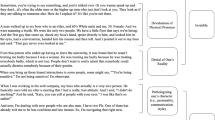Abstract
The presence of African American women at predominantly white institutions is one of historical relevance and continues to be one of first, near misses, and almosts. Individually and collectively, African American women at PWIs suffer from a form of race fatigue as a result of being over extended and undervalued. The purpose of this article is to present the disproportionate role African American women assume in service, teaching, and research as a result of being in the numerical minority at PWIs. Information is presented to provide an overview on racism in the academy, images and portrayals, psychosocial, spiritual, and legal issues for African American women faculty. Finally recommendations are presented to assist African American women faculty, and administrators, colleagues, and students at PWIs to understand and improve the climate at their institutions.
Similar content being viewed by others
References
Alfred, M. V. (2001a). Success in the ivory tower: Lessons from Black tenured female faculty at a major research university. In R. O. Mabokela, & A. L. Green (Eds.), Sister of the academy: Emergent black women scholars in higher education (pp. 57–79). Sterling, VA: Stylus Publishing.
Alfred, M. (2001b). Reconceptualizing marginality from the margins: Perspectives of African American tenured female faculty at a white research university. The Western Journal of Black Studies, 25, 1–11.
Atwater, M. M. (1995). African American female faculty at predominately white research universities: Routes to success and empowerment. Innovative Higher Education, 19, 237–240.
American Institute of Stress (2005). Job stress. Retrieved January 22, 2007, from http://www.stress.org.
Back, L. (2004). Ivory towers? The academy and racism. In I. Law, D. Phillips, & L. Turney (Eds.), Institutional racism in higher education (pp. 1–6). Sterling, VA: Trentham Books.
Banks, J. (1993). The cannon debate, knowledge construction, and multicultural education. Educational Researcher, 22, 4–14.
Benjamin, L. (Ed.) (1997). Black women in the academy: Promises and perils. Gainesville, FL: University Press of Florida.
Bradley, C. (2005). The career experiences of African American women faculty: Implications for counselor education programs. College Student Journal, 39, 518–527.
Brown, M. C. (2000). Involvement with students: How much can I give? In M. Garcia (Ed.), Succeeding in an academic career: A guide for faculty of color (pp. 71–88). Westport, CT: Greenwood Press.
Carter, D., Pearson, C., & Shavlik, D. (1988). Double jeopardy: Women of color in higher education. Educational Record, 68/69, 98–103.
Clark, R., Anderson, N. B., Clark, V. R., & Williams, D. R. (1999). Racism as a stressor for African Americans: A biopsychosocial model. American Psychologist, 54, 805–816.
Collins, A. C. (2001). Black women in the academy: An historical overview. In R. O. Mabokela, & A. L. Green (Eds.), Sisters of the academy: Emergent black women scholars in higher education (pp. 29–41). Sterling, VA: Stylus Publishing.
Collins, P. H. (2000). Black feminist thought: Knowledge, consciousness, and the politics of empowerment (2nd ed.). New York: Routledge.
Cosby, C. O., & Poussaint, R. (Eds.) (2004). A wealth of wisdom: Legendary African American elders speak. New York: Atria Books.
Cresswell, T. (1996). In place/out of place: Geography, ideology, and transgression. Minnesota: University of Minnesota Press.
Davis, L. (1985). Black and white social work faculty: Perceptions of respects, satisfaction, and job permanence. Journal of Sociology and Social Welfare, 12, 79–94.
Dillard, J. M., & Smith, B. B. (2005). African Americans’ spirituality and religion in counseling and psychotherapy. In D. A. Harley, & J. M. Dillard (Eds.), Contemporary mental health issues among African Americans (pp. 279–291). Alexandria, VA: American Counseling Association.
Dugger, K. (1996). Social location and gender-role attitudes: A comparison of Black and White women. In E. Ngan-Linf chow, D. Wilkinson, & M. Baca Zinn (Eds.), Race, class and gender: Common bonds, different voices. Thousand Oaks, CA: Sage.
Exum, W., Menges, B., Watkins, B., & Berglund, P. (1984). Making it at the top: Women and minority faculty in the academic labor market. American Behavioral Scientist, 27, 301–324.
Flint, J. R., & Ashing-Giwa, K. (2005). Kitchen divas: Breast cancer risk reduction for black women. Retrieved on January 22, 2007 from http://www.cbcrp.org/research/PageGrant.asp?grant_id=4071.
Franklin, J. H. (1989). Race and history: Selected essays (1938–1988). Baton Rouge: Louisiana State University Press.
Gates, H. L., & West, C. (2000). The African American century: How Black Americans have shaped our country. New York: The Free Press.
Gregory, S. T. (1999). Black women in the academy: The secrets to success and achievement. New York: University Press of America.
Gulam, W. A. (2004). Black and white paradigms in higher education. In I. Law, D. Phillips, & L. Turney (Eds.), Institutional racism in higher education (pp. 7–13). Sterling, VA: Trentham Books.
Harley, D. A. (2001). In a different voice: An African American woman’s experiences in the rehabilitation and higher education realm. Rehabilitation Education, 15, 37–45.
Harley, D. A. (2005a). African Americans and indigenous counseling. In D. A. Harley, & J. M. Dillard (Eds.), Contemporary mental health issues among African Americans (pp. 293–306). Alexandria, VA: American Counseling Association.
Harley, D. A. (2005b). The Black church: A strength-based approach. In D. A. Harley, & J. M. Dillard (Eds.), Contemporary mental health issues among African Americans (pp. 191–204). Alexandria, VA: American Counseling Association.
Harvey, W. B. (2004). Deans as diversity leaders. In F. W. Hale, Jr. (Ed.), What makes racial diversity work in higher education: Academic leaders present successful policies and strategies (pp. 292–306). Sterling, VA: Stylus.
Hooks, B. (1992). Representations of whiteness, black looks: Race and representation. Boston: South End Press.
Hooks, B. (1993). Sisters of the yam. Black women and self-recovery. Boston: South End Press.
Hooks, B. (1995). Killing rage: Ending racism. New York: Henry Holt and Company.
Hooks, B. (2001). Salvation: Black people and love. New York: Harper Collins.
Jarmon, B. (2001). Unwritten rules of the game. In R. O. Mabokela, & A. L. Green (Eds.), Sisters of the academy: Emergent black women scholars in higher education (pp. 175–181). Sterling, VA: Stylus.
Jones, L. (Ed.) (2001). Retaining African Americans in higher education: Challenging paradigms for retaining students, faculty, and administrators. Sterling, VA: Stylus.
Jones, C., & Shorter-Gooden, K. (2003). Shifting: The double lives of Black women in America. New York: Harper Collins.
Kawewe, S. M. (1997). Black women in diverse academic settings: Gender and racial crimes of commission and omission in academia. In L. Benjamin (Ed.), Black women in the academy: Promises and perils (pp. 263–269). Gainesville, FL: University Press of Florida.
Lawson, E. J., & Pillai, V. (1999). The persistence of racism in America’s cultural diversity. In L. L. Naylor (Ed.), Problems and issues of diversity in the United States (pp. 67–86). Westport, CT: Bergin & Garvey.
Lee, C. C., & Armstrong, K. L. (1995). Indigenous models of mental health intervention: Lessons from traditional healers. In J. G. Ponterotto, J. M. Casas, L. A. Suzuki, & C. M. Alexander (Eds.), Handbook of multicultural counseling (pp. 441–456). Thousand Oaks, CA: Sage.
McKay, N. (1983). Black woman professor—White university. Women’s Studies International Forum, 6, 143–147.
McKay, N. (1997). A troubled peace: Black women in the halls of the white academy. In L. Benjamin (Ed.), Black women in the academy: Promises and perils (pp. 11–222). Gainesville, FL: University Press of Florida.
Menges, R., & Exum, W. (1983). Barriers to the progress of women and minority faculty. Journal of Higher Education, 54, 123–144.
Mills, C. (1997). The racial contract. Ithaca: Cornell University Press.
National Institute for Occupational Safety and Health (2005). Stress. Retrieved January 22, 2007, from http://www.cdc.gov/niash/stresswk.html.
Neal-Barnett, A. (2003). Stress, anxiety, and strong black women. Soothe your nerves: The black woman’s guide to understanding and overcoming anxiety, panic, and fear. New York: Simon & Schuster.
Padilla, A. M. (1994). Ethnic minority scholars, research, and mentoring: Current and future issues. Educational Researcher, 23, 24–27.
Poussaint, A. F., & Alexander, A. (2000). Lay my burden Down: Unraveling suicide and the mental health crisis among African Americans. Boston: Beacon Press.
Pruitt, A. (1982). Black employees in traditional white institutions in the ‘Adams’ states, 1975–1977. New York: American Education Research Association.
Purwar, N. (2004). Fish in and out of water: A theoretical framework for race and the space of academia. In I. Law, D. Phillips, & L. Taurney (Eds.), Institutional racism in higher education (pp. 49–58). Sterling, VA: Trentham Books.
Rangasamy, J. (2004). Understanding institutional racism: Reflections from linguistic anthropology. In I. Law, D. Phillips, & L. Taurney (Eds.), Institutional racism in higher education (pp. 27–34). Sterling, VA: Trentham Books.
Riley, D. W. (1995). The complete Kwanzaa: Celebrating our cultural harvest. New York: Harper Collins.
Shorter-Gooden, K. (2004). Multiple resistance strategies: How African American women cope with racism and sexism. Journal of Black Psychology, 30, 406–425.
Smith, P. (1999). Teaching the retrenchment generation: When Sapphire meets Socrates at the intersection of race, gender, and authority. William and Mary Journal of Women and Law, 53, 1–141.
Thompson, C. J., & Dey, E. L. (1998). Pushed to the margins: Sources of stress for African American college and university faculty. The Journal of Higher Education, 69, 324–345.
Thompson, G. L., & Louque, A. C. (2005). Exposing the “culture of arrogance” in the academy. Sterling, VA: Stylus.
Trower, C. A., & Chait, R. P. (2002). Faculty diversity: Too little too long. Harvard Magazine. Retrieved November 8, 2006 from http://www.harvard-magazine.com.
Turner, C. S. V. (2002). Women of color in academe: Living with multiple marginality. The Journal of Higher Education, 73, 74–93.
Turner, C. S. V., & Myers, S. L. (2000). Faculty of color in academe: Bittersweet success. Boston: Allyn & Bacon.
Utsey, S. O., Adams, E. P., & Bolden, M. (2000). Development and initial validation of the Africultural Coping Systems Inventory. Journal of Black Psychology, 6, 194–215.
Villapando, O., & Bernal, D. D. (2002). A critical race theory analysis of barriers that impede the success of faculty of color. In W. A. Smith, P. G. Altbach, & K. Lomotey (Eds.), The racial crisis in American higher education (pp. 243–269). New York: State University of New York Press.
Washington, D. E. (1997). Another voice from the wilderness. In L. Benjamin (Ed.), Black women in the academy: Promises and perils (pp. 270–278). Gainesville, FL: University Press of Florida.
Weems, R. E. (2003). The incorporation of Black faculty at predominantly white institutions: A historical and contemporary perspective. Journal of Black Studies, 34, 101–111.
Weinberg, M. (1977). A chance to learn: The history of race and education in the United States. New York: Cambridge University Press.
Wenniger, M. D., & Conroy, M. H. (2001). Gender equity or bust: On the road to campus leadership with women in higher education. San Francisco: Jossey-Bass.
West, C. (1993). Race matters. New York: Vintage Books.
Williams, L. D. (2001). Coming to terms with being a young, black female academic in US higher education. In R. O. Mabokela, & A. L. Green (Eds.), Sisters of the academy: Emergent black women scholars in higher education (pp. 93–104). Sterling, VA: Stylus.
Wolfman, B. R. (1997). Light as from a beacon: African American women administrators in the academy. In L. Benjamin (Ed.), Black women in the academy: Promises and perils (pp. 158–167). Gainesville, FL: University Press of Florida.
Wyche, K., & Graves, S. (1992). Minority women in academia: Access and barriers to professional participation. Psychology Of Women Quarterly, 16, 429–437.
Author information
Authors and Affiliations
Corresponding author
Rights and permissions
About this article
Cite this article
Harley, D.A. Maids of Academe: African American Women Faculty at Predominately White Institutions. J Afr Am St 12, 19–36 (2008). https://doi.org/10.1007/s12111-007-9030-5
Received:
Accepted:
Published:
Issue Date:
DOI: https://doi.org/10.1007/s12111-007-9030-5




